Democrats Have 9 Point Advantage
49 percent of Americans lean Democratic, compared to 40 for Republicans. Yet a plurality identify as Independent.
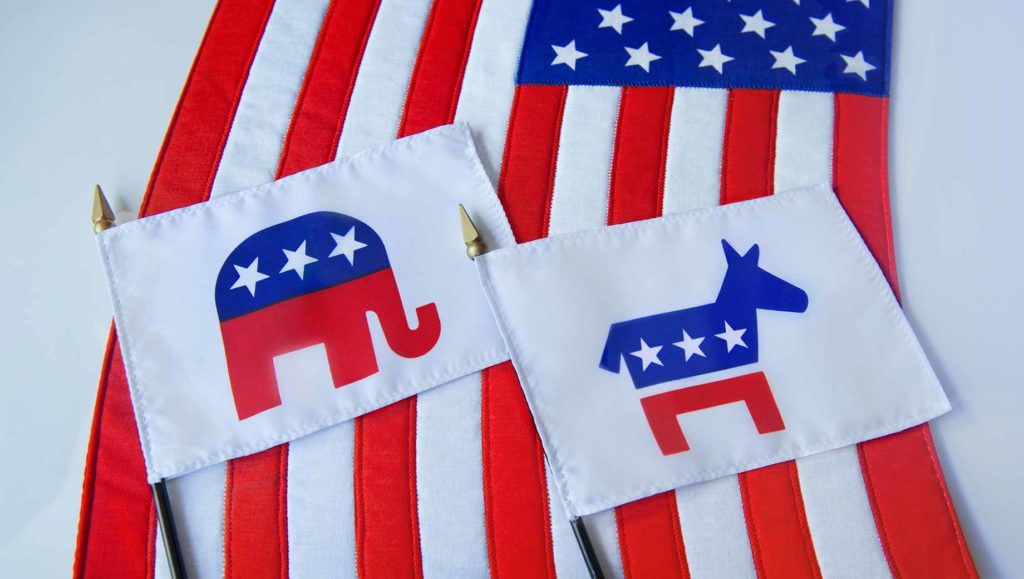
Gallup (“Quarterly Gap in Party Affiliation Largest Since 2012“):
In Gallup polling throughout the first quarter of 2021, an average of 49% of U.S. adults identified with the Democratic Party or said they are independents who lean toward the Democratic Party. That compares with 40% who identified as Republicans or Republican leaners. The nine-percentage-point Democratic advantage is the largest Gallup has measured since the fourth quarter of 2012. In recent years, Democratic advantages have typically been between four and six percentage points.
Gallup routinely measures U.S. adults’ party identification and the political leanings of independents. In the first quarter, 30% of Americans identified as Democrats and 19% were Democratic-leaning independents, while 25% were Republican identifiers and 15% Republican-leaning independents. The vast majority of the remaining 11% were independents with no partisan leanings.
The latest figures were measured as President Joe Biden was inaugurated despite rioters’ attempts on Jan. 6 to disrupt the certification of his victory in the 2020 election. The first quarter also saw a steady decline in U.S. coronavirus deaths and infections from its early January peak, a great expansion of COVID-19 vaccinations, and the passage of a $1.9 trillion COVID-19 relief package.
Given the pandemic and the post-election events, it’s not surprising that Democrats would get a bump. But context is key here:
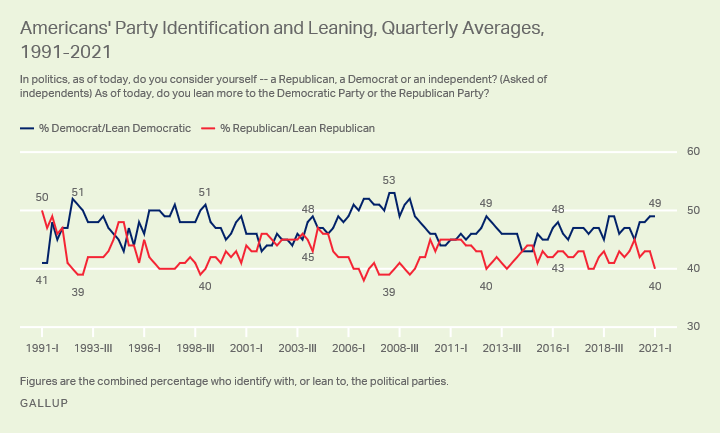
So, over the last thirty years, the fluctuations have been pretty significant but within a tight range. Both parties tend to stay between 40 and 50, with deviations outside that rare short-lived and small. And, yes, very much tied to events.
Democrats have had larger advantages in the past than they currently hold, including double-digit advantages throughout most of 2006 through early 2009. That period encompassed the end of the George W. Bush administration, when he was unpopular, and the election of Barack Obama as his successor. The party also had double-digit advantages around the time of Bill Clinton’s election as president in late 1992 and early 1993. The prior nine-point Democratic edge in the fourth quarter of 2012 coincided with Obama’s reelection.
Republican advantages have generally been rare and short-lived, but occurred when Americans rallied around incumbent Republican presidents George H.W. Bush after the 1991 U.S. victory in the Gulf War and George W. Bush after the Sept. 11, 2001, terrorist attacks. The GOP also had brief leads in party affiliation in the periods surrounding Republican electoral successes in the 1994, 2010 and 2014 midterm elections.
If I were to guess, the short-term fluctuation is almost entirely within the “leaners.” They don’t associate themselves with either party but tend to vote for the same one over and over (assuming they vote at all). And, indeed, we have a spike in self-identified Independents:
The 44% of Americans who identify as political independents, whether they subsequently express a party leaning or not, is up from 38% in the fourth quarter of 2020 and is above 40% for the first time since 2019. This is consistent with the historical pattern whereby independent identification typically declines in presidential election years and increases in odd-numbered years.
However, the percentages identifying as independent in 2020 and thus far in 2021 have been unusually high compared with prior presidential election and odd-numbered years. Thus, the current level of independent identification ranks among the highest Gallup has measured in any quarter since 1988, with the high being 46% in the fourth quarter of 2013.
The trend chart, minus leaners:
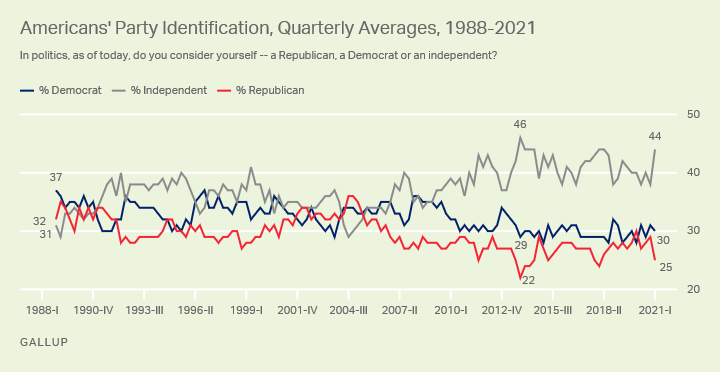
After a modest peak with George W. Bush’s re-election—the only time a Republican has won the popular vote since 1988—we’ve seen a substantial drop-off in Republican party identification. While it’s one that largely goes away when we add in leaners, one would think it would be this group that is easiest to pick off.
Still, the 44 percent “Independent” group is misleading. That neither of the binary choices draws their loyalty is noteworthy. But the fact of the matter is that turnout is at recent highs and most of these folks vote for the same party election after election.

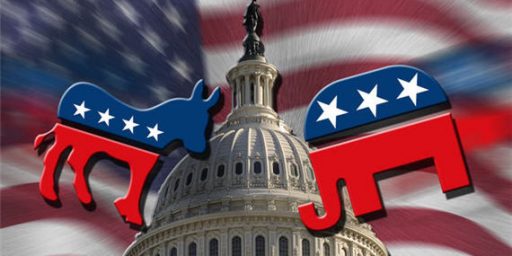
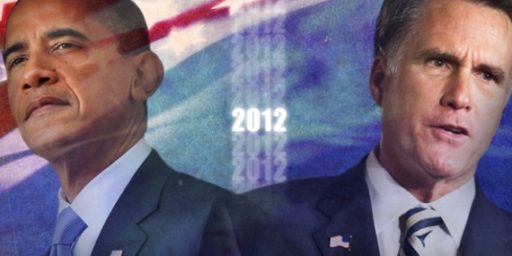

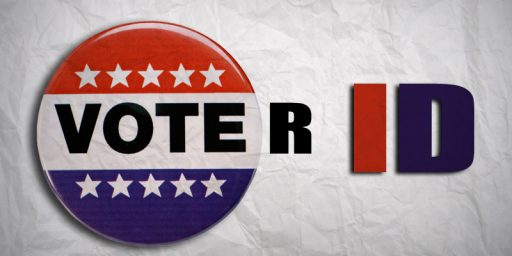

Which gets to a point about the meaning of “loyalty.” If someone consistently votes for the same party election after election doesn’t that count as a type of “loyalty?”
Also, from a comparative political science PoV, is this “majority ‘independent'” a US phenomenon or consistent in other countries with a limited choice of major political parties?
I wonder to what degree this is also related to a US value of “rugged individualism,” where we want to create self-narratives that we are much more independent and open-minded than we are (aka the talk-radio caller or post commentator who begins with “I have an open mind and listen to all sides and sources” before regurgitating one side’s talking points).
One other hypothesis — is there is a practical aspect to this–while I am by my modern voting record more or less a consistent Democratic party voter, I’m still registered as an independent to cut down on mail and fundraising appeals.
@mattbernius: Much of the US’s founding mythology is fodder for professional indies–the Framers’ attacks on the idea of parties, Washington’s refusal to identify by a party, the almost accidental emergence of the party system. No other democracy has that as part of its origin story.
I’m officially registered as Independent (I) in my state and therefore would be counted among the 44%. I did it as a youth to break away from my conservative upbringing but couldn’t bring myself to register as a Dem due to years indoctrination of how terrible they were. I told myself it meant I was a “free-thinker” and not bound to any party ideology, only my own conscience. I’ve never voted anything other then straight (D) my entire life. Some in family went (I) during the W years because while they remained staunchly conservative to their bones, they couldn’t stand the man and the negative image being publicly GOP; many more did it during this last Admin as Trump was too big a pill to swallow. They’re all pulled the (R) lever in every election.
Sooooo many people claim to be “independent” or even “Independent (I)” when they just don’t like the label their preferred party has. It doesn’t mean they’re more reachable or willing to jump the fence; it means they don’t want folks in an increasingly hostile and partisan landscape to pre-judge them.
@mattbernius:
Actually my impression is that Americans are far more interested in belonging to a party than many other countries. I’m Canadian, and the only people I know who are members of a party are people who actively do things for that party (fund raising, helping campaigns etc). Even people who vote for the same party every year tend not to join a party.
Some of that might be because of the separation between federal and provincial parties — many people vote for different parties provincially and federally, even seemingly unlikely splits as NDP provincially and conservative federally. But I think its mainly because party membership seems pointless unless you’re actually involved with the party, and most people don’t want to do more than vote in an election.
My guess is that independent is the norm for voters in most of the world — voting for a party is different than being a member of it.
Probably because they crash the economy every time they get into power.
‘Independent’ sounds great. Excellent word, excellent thing to be.
Now commission a poll. Ask Americans how many think they’re cool. Same thing.
@Stormy Dragon:
I wonder if Biden will be able to buck the trend that the party in power loses ground in the midterm elections (yes, we all know about the W. Bush first midterm exception).
In 2021 he will have two things going for him: 1) the end of the trump pandemic, and 2) economic recovery.
There is one big caveat: we don’t know if there will be enough vaccinations to end the pandemic, or whether a large number of unvaccinated idiots will provide a big reservoir for the trump virus to evolve variants that render vaccine protection less effective.
This would naturally delay the end of the pandemic, even if most death would occur among the people who chose to forego protection, and it would blunt the recovery as well.
Best case scenario, the economy is good by the midterms, people are back to work, and Biden can point to the COVID stimulus bill and, likely, the infrastructure bill, as the cause of the good economy, he certainly can claim victory with vaccination, which did pick up speed after his administration took over distribution.
Then comes turning out the vote. Perhaps the many restrictions which will no doubt follow the Georgia example might be motivator enough.
And we assume no major scandals or disasters in the meantime.
@Kathy: Dems are making a concerted effort to avoid the political mistakes that hampered the Obama Admin in its first two years and led to the 2010 midterm debacle. Obviously, the big thing is their not allowing themselves to get caught on the bipartisan trap, and their willingness to use reconciliation broadly (and possibly do filibuster reform–we’ll see).
But there are other, less talked about factors. The Obama Admin seriously underestimated the depths of the recession (which could happen again, but probably won’t) and filled their economic posts with deficit alarmists. (It’s significant to me that Larry Summers as of late has been badmouthing the Covid relief bill and proposed infrastructure plans, with all the standard fear-mongering about fiscal doom and runaway inflation.) I also think Dems could never quite remove the stench of the unpopular corporate bailouts, which enabled Republicans to position themselves (with their usual brazen dishonesty) as the populists running against big business (something they’re trying to repeat now with the attacks on woke decisions and the Georgia boycott).
Obama did attempt to avoid the mistakes of his predecessors. The problem was that it was centered more on policy than politics, and he seemed to believe good policy would invariably lead to good politics. He studied the mistakes that led to the collapse of Bill Clinton’s 1993 health-care plan, and did manage to succeed where Clinton failed. But what’s interesting is that it didn’t seem to matter in the end, in terms of the political effects. Both were saddled with massive, complicated, Rube Goldberg-like health-care bills they couldn’t adequately explain to the public, and which were easy for Republicans to brand negatively.
The unfortunate thing is that Dems’ current majorities are so razor-thin the GOP doesn’t even need a massive wave election to gain control. Indeed, Dems currently are just one sudden death away from losing their Senate majority long before the midterms even happen. This can be a double-edged sword for the GOP, though: part of what made the midterms of 1994 and 2010 possible was that the Dem majorities were so massive it made them more vulnerable and exposed because they occupied so many seats in reddish districts.
@Kylopod:
I strongly favor learning from other people’s mistakes, but with two big warnings:
1) Knowing where others went wrong doesn’t mean you know how to go right.
2) Avoiding a known mistake always leaves you open to new mistakes.
One thing Biden is doing rather well is sell the virtues of his COVID relief bill. He will have to do the same with the infrastructure bill, and anything else he manages to pass next.
I am on the verge of switching my registration from Democratic to unaffiliated simply in hope that it will slow the staggering flow of mail — both email and paper — I receive begging for money.
Somebody linked to this Kevin Drum piece yesterday, but I think it bears repeating here. Most Americans Know Nothing About Politics. Nothing.
@Michael Reynolds:..Ask Americans how many think they’re cool. Same thing.
Fuckin’ A Dude! Groovey!
@Kathy:
I think the biggest factor effecting 2022 will be how successful the GOP is at gerrymandering the redistricting process to insulate themselves from popular will.
@gVOR08: Heh. Indeed.
@Michael Cain: that’s why God invented Spam Filters.
The fact that self-identified independents have grown in number since the early oughts, corresponding to when party sorting and the culture wars really took off, is dispositive IMO. Yes, people still vote, fairly consistently, for one party or another. But that’s because they don’t have alternatives and one side or the other is usually consistently the least-bad choice.
Imagine a world, for instance, where every four years we vote on the single flavor of ice cream that everyone will be eating for the next four years. And those choices are always Lime Sherbert and Spumoni. We shouldn’t be surprised to learn that a plurality of people would prefer something besides these two choices. We also shouldn’t be surprised that absent other choices, most people will consistently tend to prefer one of these bad flavors over the other. Constraining choice to two flavors and then declaring that Lime Sherbert is the most popular ice cream in America is a serious analytical error. It was only the most popular because the competition was Spumoni.
So what the high numbers of independents show, as well as the polls that show very strong and growing support for the idea of third parties, is a wide level of dissatisfaction with what the two binary choices are offering. And these numbers have increased consistent with the trend lines on ideological sorting and the narrowing of party constituencies and interests as well as negative partisanship. That’s not a coincidence. The two parties do represent narrower constituencies than they used to. The fact that people continue to vote for these parties, despite their obvious dissatisfaction, is entirely driven by the lack of competing options – especially when there is lots of propaganda that constantly tells voters that doing anything except vote for one of those binary choices is both dumb and morally deficient.
Nor should we ignore the fact that the two major parties have consistently collaborated to weaken the ability for third parties to even provide the option for a protest vote, particularly after Ross Perot. The recent HR1 bill, for example, contains several provisions that are specifically designed to cement the already entrenched positions of the two parties by intentionally making it more difficult for other parties to get on the ballot. The parties – to include Democrats – are only interested in “democracy” when they are the only choices.
This Is HUGE!
I have lived in and been a property owner in Makanda Township since 1985. As long as I can remember the Republicans have ruled here. I have voted in these Township elections for years never expecting to see a Democratic landslide like this.
*The photo in the link is of the locally famous Makanda Boardwalk which lies within the political boundries of The Village of Makanda home of the annual Buzzard Fest. While the Village lies entirely within Makanda Township it is an independent entity with it’s own Government apart from Makanda Township. I live in the Township not the Village.
@Northerner:
In most countries party membership involves a membership fee. This is not so in the U.S., where it’s just a choice made as part of the voter registration process.
In states that have closed primaries, such as my state AZ, you can only vote in a primary if you are registered with the relevant party.
In TX, it’s just a label you can give to a pollster, as TX does not register by party. (In TX, you get the option to vote in just one of the party primaries on election day).
My elation over the Great Democratic Victory of 2021 is tempered by the dismal turnout in Jackson County IL for these local elections.
Registered Voters 32658
Ballots Cast 5217
A miserable 15.9%
I am still not going to advocate for any kind of compulsory voting in this country. Actually I haven’t heard much about laws to make Citizens vote or be punished since Trump was elected. I wonder why?
@Mister Bluster:
The off-cycle election is a very effective voter suppression tactic that almost no one talks about.
@charon:..This is not so in the U.S., where it’s just a choice made as part of the voter registration process.
Not in all States:
If I vote in a primary election in Illinois I must select a ballot of the party whose primary I am voting in but that does not register me as a member of that party. If it did I would not vote in those elections.
These are the final results of the abovementioned Makanda Township elections.
All precincts reporting 100% of votes counted.
Since I copy and pasted this from somewhere I have no idea what it will look like when I hit Post Comment and no telling if i will ever see an EDIT button.
I do see an EDIT button however I am not touching this. The old preview format from years ago was much easier to work with but I understand it is not anything that we will get here again.
EOBS (end of bitching session)
It’s been a very good day. I got my $1400 Direct Deposited into my bank account so I should stop complaining.
Thank You President Biden!
@Andy: “…Experience hath shewn, that Mankind are more disposed to suffer, while Evils are sufferable, than to right themselves by abolishing the Forms to which they are accustomed.” As Mr Jefferson famously said.
@Mister Bluster:
I once lived in TX which has a similar open primary system.
I prefer closed primaries, less potential for low-information independents and ratfvkkur Republicans to mess around in the Dem primary.
Lots of variety in the various states, e.g., jungle primaries like in CA and LA which I think are really bonkers.
You can check out a site called the “Green Sheets” that has all the gory details.
@Mister Bluster:
Yup, big doing in Sleepytown, the revolution has started.
@charon:
Though closed primaries are more likely to nominate an extremist candidate.
@mattbernius:
This. People want to think of themselves as independent minded. But I suspect this isn’t how the human brain works. If it was, advertising wouldn’t work as well as it does and political talking points wouldn’t work as well as they do.
But the best evidence lies in silicon valley. If people were capable of libertarian autonomy, all those little nudges wouldn’t work. It’s the synthesized version of the lancet fluke applied to humans.
I chuckled to myself when, I think it was @Gustopher, remarked that he didn’t find zombies plausible in movies. I get it. It’s not my thing either. But not for that reason. I look around and all I see is zombies. And that includes when I look in the mirror.
Even if one can beat it back some of the time about particular things, there are other areas that we can’t. It’s part of being human.
@Andy:
And yet a higher share of population chose to buy ice cream the last two quarters. If they were truly as dissatisfied as they claim in polls, they wouldn’t buy it anymore.
A viable third party won’t solve the problem, because where do we situate it? The center? That won’t please the third of Republicans who want a more conservative third party. Sure, maybe the GOP moves to the center and the Dems move to the left to pick up DSA votes. People are still going to be dissatisfied.
Imagine two old guys sitting at McDonald’s complaining about socialism resulting in everyone eating gruel. That’s America.
@Sleeping Dog:
That is obviously a problem in GOP primaries. Dem primaries are a bit more pragmatic e.g./ Jim Clyburn and the 2020 SC primary.
Or unqualified candidates, recall D J Trump’s pretending to be some sort of moderate in 2016.
But recall Trump also did well with new (i.e., low information) voters who probably were very present in open primaries.
@Kurtz:
Because the people believe “ice cream” is important, even if they are dissatisfied with the options. A lot of us consider it a civic duty. Many choose one flavor of ice cream only as a vote against the other flavor because they hate the other flavor and don’t want to be forced to eat it. And because everyone understands that one of the two flavors will be chosen, so you might as well pick the least bad option.
The only reason we have two parties now is because of the structure of our system. The idea that there are only two natural constituencies in a diverse nation of 330 million is laughable IMO. It’s the systemic incentives that have constructed the de facto binary system. Yes, a third party won’t work, at least not for more than perhaps one or two election cycles, or as a transition to replacing one of the other two parties, as long as the system remains as it is.
If we had a multiparty system like most other countries, we’d probably have at least six different parties. The Democrats and Republicans would see their support drop to their actual levels and they’d have to actually work and not take votes for granted. The DSA wing of the Democratic party (Bernie, AOC, etc.) would probably run under the DSA banner. The nativist Trump faction would form a right-wing anti-immigration party. People who really would rather be Libertarians or Greens wouldn’t have to subsume their principles anymore to the tyranny of the binary choice. Maybe the shells of the Republicans and Democrats would form center-left and center-right parties. Maybe we’d have regional parties. Maybe we’d have ethnic parties. Who knows how it would all break out, but one thing is certain, the current two-party lock on national politics would end.
None of that is going to happen anytime soon. But current trends cannot continue forever where the current two parties keep dropping in popularity, yet are buoyed by negative partisanship; they remain weak in terms of direction, coherence, and vulnerability to capture while simultaneously being too big to fail. I don’t know what’s ultimately going to happen, but I don’t think the current path and trends are sustainable.
@Andy:
@Kurtz:
What is the political equivalent of cake in this analogy? (asking for a friend who has very strong opinions about ice cream + cake)
This discussion brings to mind the category of people who preeningly refer to themselves as Pragmatists. “When it comes to politics, I’m only interested in what works.” (dislocates shoulder while patting oneself on the back)
As if values, (implicit) partisanship, etc. are somehow divorced from the operationalization of “what,” “works,” and “what works.” This category overlaps with Independents, but not entirely.
I want a party that calls itself the Multitudes and who sees Daniel Kahneman as their lodestar.
@Andy:..The off-cycle election is a very effective voter suppression tactic that almost no one talks about.
This article is all I can find right now that mentions the Illinois Consolidated Elections. It is 20 years old but does give some background as to why they exist.
Apparently there was an expectation that turnout would increase and money would be saved.
@Andy:
I know why we only have two parties. I’m not defending the system. I don’t know enough details about other systems to comment on the five or six parties, but it strikes me as likely to cause a similar level of dysfunction as the status quo.
But I’m not sure that really matters here, because your argument assumes that the OP is a normative statement. Instead, it’s descriptive. Likewise, my point about the notion of self-ID independents was less about should than about how those most of those ‘independents’ behave in reality.
Independent/non-affiliated seems like two things to me:
A cultural badge of honor; and/or
Self-delusion–a way to distinguish oneself from the unreasonable, high volume partisans; a signifier of a particular view of rationality. (I have a much different take on human nature than many.)
Moreover, your assertion about two natural constituencies cuts both ways. I agree that it’s laughable, but it’s reflective of a forced false choice between idealism and realism. And, like the difficulties of establishing the rules of engagement on a battlefield, it tends to get messy once we evaluate individual behavior.
Meaning, even in a world with 2+n parties, all of us will still be left with choices that don’t match all of our preferences. We would still have people claiming they are independent, but I would be willing to bet they would still routinely vote for the same party in every election. I suppose that if voting is a civic duty, that world is better from the perspective of an idealist, because it represents a closer-to-complete fulfillment of that duty. Holding one’s nose less is good, but it’s indicative of lesser pungency rather than a panacea.
I think the best way to interpret the polling here is to see it as a comment on the current state of the GOP rather than an implicit endorsement of Dems. On that, I think we agree.
I suspect that a lot of it is an indication of a general feeling that Republicans have hacked the system via flaws rather than persuaded. We may not agree on that. But it seems to me that election season propaganda did it’s job a little to well on that side of the aisle.
@Kurtz:
I think one’s perspective on voting = duty is important to understanding their perspective on politics, party identity, etc. It’s tricky, though, because a lot of people’s perspective is seemingly implicit and, thus, running in the background outside immediate awareness.
@Andy: The fabled ‘two party system’ has been thought to save us the difficulties faced by most of the world’s democracies of forming coalition governments. In the past each of the two parties had sufficient diversity (of opinion and of demographics) to form a governing party in legislators and in administration. Given the divisions that we see around us in this horrible 21st century I doubt that any combination of parties could be formed into a governing body in Congress and I am as certain as sun-rises-tomorrow that no slate of parties could agree on a single candidate for President.
I note that the British seem to have developed a two party system. One does not see multiple Canadian or Australian parties — altho they have existed in the past.
I also note that Israel seems to have reached a constitutional blind alley and cannot solve their problem any more than we can ours. (Hat tip to Dr Taylor who taught me about 1st past the post voting.)
Nice thought though. A really pure parliamentary style government would be my choice if we had a chance to do 1789 over again. No way we could switch neatly to that, of course.
@Sleeping Dog:..the revolution has started.
We are obscene lawless hideous dangerous dirty violent and young
encore…
(no place to hide)
@Mimai:
I thought you were just here for the cake and ice cream.
@Kurtz:
Mom said I had to at least try to play nice with the other kids too.
@Mimai:
I agree with you, btw.